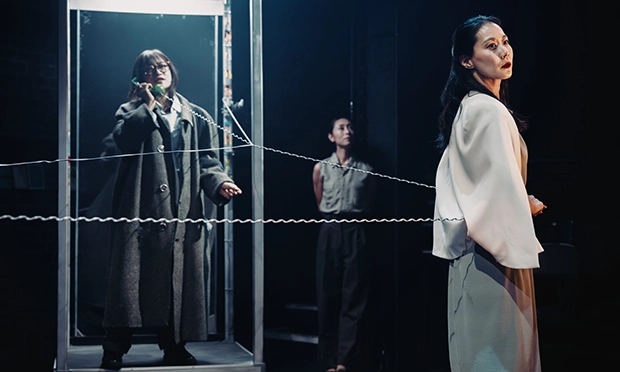Sputnik Sweetheart, Arcola Theatre, stage review: ‘Spinning and spinning’

Millicent Wong, Yuyu Rau and Matsumi Kuroda on stage. Photograph: courtesy Arcola
Haruki Murakami is a master of literature.
Rambling global settings and gnawing sense of loss have cemented themselves as staples in his style, along with a lack of concise endings.
Bryony Lavery’s recent adaptation wrestles with a lesser-known work, Sputnik Sweetheart.
The story has very little to do with space, and instead focuses on narrator K’s (Naruto Komatsu) stunted, pining relationship with Sumire (Millicent Wong).
They are drawn together by their love of literature, classical music and loneliness. But Sumire does not reciprocate his longing adoration.
When she meets Miu (Natsumi Kuroda), a stylish wine importer 17 years her senior, her life changes.
It leaves K trailing behind, updated by phone and burning with unrequited desire.
All seems rather simple, doesn’t it?
This is a love triangle featuring all the Murakami tropes: depression, isolation, conforming to a rigid society.
But hold on, dear reader, all is not what it seems.
Sumire vanishes while on a business trip with Miu in Greece, and all hell breaks loose.
Shizuka Hariu’s set is versatile and modernist. An illuminated, partly mirrored phone box – a theme throughout the writer’s work – glows and spins on tiny wheels.
A single ladder leads to an overhanging balcony, and poles descend to chop up the space stage right.
Over the top of this black-and-white world, Sonoko Obuchi’s cartoons projections offer a comic layer on top of the heavy-going subject matter.
Director Melly Still moves us through Japan, Switzerland and Greece with explosions of flapping limbs and lyrical style movement.
Although an understandable choice in the limited space, it doesn’t quite work. The rapid changes from serious acting to serious dancing jolts one out of the story.
Lavery also has a tough task on her hands, weaving Murakami’s dreamlike prose into a working, standing narrative, and at points she succeeds.
The pre-mobile-phone world, conjured by stretching cords and lengthy, static conversations between K and Sumire, gives a sense of their dynamic.
The placement of actors for the big-ticket scenes is well thought out, but all the blocking in the world can’t make up for an overall flat and emotionally stale feeling.
Wong doesn’t quite nail our female Jack Kerouac wannabe, and her sexual confusion rings hollow.
Similarly, although Komatsu gives a consistent performance as K, he swallows a lot of the scripted humour.
Kuroda, as the stylish and confident yet deeply damaged Miu, tends towards melodrama, with unnatural sweeping gestures that conflict with the more paired-back physicality of her fellow actors.
The plot (no spoilers, I promise) takes a sci-fi left turn in the last half an hour, and with the lack of emotional clarity, this difficult pivot splutters out like a wet log on an open fire.
We are lost in the hurriedly introduced multiverse, and the burdensome highbrow symbolism winds us into a tighter and tighter ball.
Sputnik is mentioned as a metaphor for the drifting aimlessness of the characters, but we the audience feel more like Laika the space dog: bewildered by the events unfolding around us, shot out into the unknown in a little black box, spinning and spinning and spinning.
Sputnik Sweetheart runs until 25 November at the Arcola Theatre.
